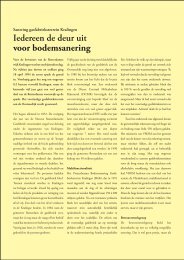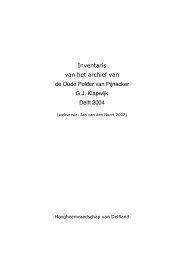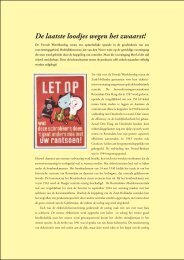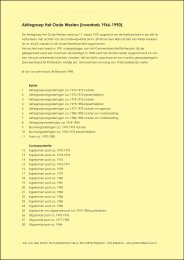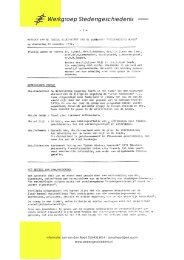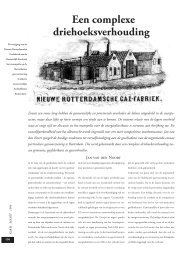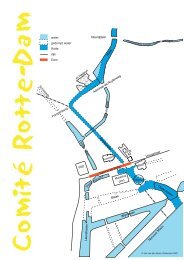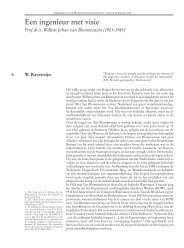Net Werk voor de Geschiedenis van Hygiene en Milieu, 1999-2001 ...
Net Werk voor de Geschiedenis van Hygiene en Milieu, 1999-2001 ...
Net Werk voor de Geschiedenis van Hygiene en Milieu, 1999-2001 ...
Create successful ePaper yourself
Turn your PDF publications into a flip-book with our unique Google optimized e-Paper software.
22<br />
23<br />
ing the attraction of population to<br />
this region, its tourist industry and<br />
urban <strong>de</strong>velopm<strong>en</strong>t. This research<br />
aims to explore the significance of<br />
cultural and historic resources for<br />
the <strong>de</strong>velopm<strong>en</strong>t of a gre<strong>en</strong>way<br />
network for the conservation of<br />
landscape quality. The landscape is<br />
studied in two levels (regional and<br />
local), through two case studies:<br />
northern municipalities of Lisbon<br />
metropolitan area, and the municipality<br />
of Amadora (in Lisbon<br />
metropolitan area). This research<br />
conclu<strong>de</strong>s that cultural and historic<br />
resources have a high pot<strong>en</strong>tial for<br />
the <strong>de</strong>velopm<strong>en</strong>t of gre<strong>en</strong>way networks<br />
in anci<strong>en</strong>t settled metropolitan<br />
Mediterranean landscapes, such<br />
as in Lisbon metropolitan area.<br />
Such a network can provi<strong>de</strong> for the<br />
conservation of landscape quality<br />
and bring about <strong>de</strong>velopm<strong>en</strong>t and<br />
recreation opportunities. However<br />
to thoroughly achieve these objectives,<br />
the criteria for the assessm<strong>en</strong>t<br />
of cultural and historic resources<br />
have to consi<strong>de</strong>r diversified levels of<br />
cultural and historic significance,<br />
becoming therefore significant<br />
resources for the economic <strong>de</strong>velopm<strong>en</strong>t<br />
and cultural i<strong>de</strong>ntity at a national,<br />
regional and local scale.”<br />
Rivera, J. A. Acequia Culture: water,<br />
land, and community in the Southwest.,<br />
(Albuquerque: University of<br />
New Mexico Press, 1998), ISBN<br />
0826318592, 256 blz.<br />
Rothman, H. K. Devil’s bargains:<br />
tourism in the tw<strong>en</strong>tieth- c<strong>en</strong>tury<br />
American West, (Lawr<strong>en</strong>ce:<br />
University Press of Kansas, 1998),<br />
ISBN 0700609105, 434 blz.<br />
“The American West has always<br />
be<strong>en</strong> se<strong>en</strong> as a land of opportunity,<br />
but tourism has transformed it into<br />
a land of opportunism. From Sun<br />
Valley to Santa Fe, towns all over<br />
the region have be<strong>en</strong> turned over to<br />
outsi<strong>de</strong>rs - not just those who visit,<br />
but those who control.”<br />
Rothman, H. <strong>en</strong> C. Miller (eds.)<br />
Out of the woods. Essays in <strong>en</strong>vironm<strong>en</strong>tal<br />
history, (Pittsburgh:<br />
University of Pittsburgh Press,<br />
1998), ISBN 0822956314.<br />
Schnei<strong>de</strong>r, P., The Adirondacks: a<br />
history of America’s first wil<strong>de</strong>rness,<br />
(New York: H<strong>en</strong>ry Holt,<br />
1997).<br />
Shra<strong>de</strong>r-Frechette, K. <strong>en</strong> L. Westra<br />
Technology and Values, (Lanham:<br />
Rowman and Littlefield, 1997),<br />
ISBN 0847686302, 356 blz.<br />
Smith, M. J. Ecologism, (Milton<br />
Keynes: Op<strong>en</strong> University Press,<br />
1998), ISBN 0335196039, 113<br />
blz.<br />
“Ecological thinking within social<br />
and political theory has tak<strong>en</strong> off in<br />
the past three <strong>de</strong>ca<strong>de</strong>s. Gre<strong>en</strong> movem<strong>en</strong>ts<br />
have had a dramatic impact<br />
upon political and social life, provoking<br />
conflicts of interest over<br />
major areas of public policy. Ecological<br />
concerns are oft<strong>en</strong> grafted<br />
64<br />
contactblad <strong>van</strong> <strong>de</strong><br />
stichting net werk <strong>voor</strong> <strong>de</strong><br />
952-953<br />
geschie<strong>de</strong>nis <strong>van</strong> hygiëne <strong>en</strong> milieu<br />
redactie: myriam d a r u<br />
webversie: jan <strong>van</strong> <strong>de</strong>n n o o r t<br />
onto existing approaches, but this<br />
text examines how the fundam<strong>en</strong>tal<br />
questions raised by a gre<strong>en</strong> perspective<br />
transform the terms of refer<strong>en</strong>ce<br />
of mo<strong>de</strong>rn thinking.”<br />
Spek, T., ‘Interactions betwe<strong>en</strong><br />
humans and woodland in prehistoric<br />
and medieval Dr<strong>en</strong>the (the<br />
<strong>Net</strong>herlands): an interdisciplinary<br />
approach.’, in: Keith J. Kirby <strong>en</strong><br />
C. Watkins The Ecological History<br />
of European Forests, (New<br />
York: CAB International, 1998),<br />
pp. 81-93.<br />
Squatriti, P. Managing water in<br />
medieval Europe, (Lei<strong>de</strong>n: Brill,<br />
<strong>1999</strong>), ISBN 09004106804, 526<br />
blz.<br />
Squatriti, P. Water and Society in<br />
Early Medieval Italy, AD 400-<br />
1000, (New York: Cambridge<br />
University Press, 1998), ISBN<br />
0521621925, 206 blz.<br />
“Discussing water and its relationship<br />
with people, this text<br />
shows how early medieval Italian<br />
societies coped with the problems<br />
of having too much or too little<br />
water, and analyzes their use of<br />
it. Such treatm<strong>en</strong>t illuminates the<br />
workings of both post classical<br />
societies and of the <strong>en</strong>vironm<strong>en</strong>ts<br />
in which these societies lived.<br />
Domestic usage, bathing, irrigation<br />
and drainage, fishing, and<br />
milling all receive full coverage.<br />
This is an interdisciplinary study<br />
which proves that ev<strong>en</strong> after the<br />
“fall” of Rome, people continued<br />
a dialectical relationship with<br />
the natural resources that shaped<br />
their experi<strong>en</strong>ces just as <strong>de</strong>cisively<br />
as their efforts re<strong>de</strong>signed the waterscape.<br />
It may be of interest not<br />
only to Italianists, but to historians<br />
of technology, agrarian, social,<br />
and cultural historians, and<br />
<strong>en</strong>vironm<strong>en</strong>tal historians.”<br />
T<strong>en</strong>ner, E. Why things bite back.<br />
Technology and the rev<strong>en</strong>ge<br />
of unint<strong>en</strong><strong>de</strong>d consequ<strong>en</strong>ces,<br />
(New York: Vintage Books,<br />
1997), ISBN 0 679 74756 7,<br />
431 blz.<br />
Vlis, I. <strong>van</strong> <strong>de</strong>r, ‘’Bij <strong>de</strong> slag <strong>van</strong><br />
Nieuwpoort kek<strong>en</strong> <strong>de</strong> Spanjaar<strong>de</strong>n<br />
teg<strong>en</strong> <strong>de</strong> zon in’’, Historisch<br />
Nieuwsblad, jrg. 8 (1998) 2, pp.<br />
26. Interview <strong>van</strong> Jan Buisman,<br />
klimaathistoricus.<br />
Westra, L. ,Living in integrity: a global<br />
ethic to restore a fragm<strong>en</strong>ted<br />
earth, (Rowman & Littlefield,<br />
1998), ISBN 0847689271, 288 blz.<br />
Wolch, J. <strong>en</strong> J. Emel, Animal geographies.<br />
Place, politics, and i<strong>de</strong>ntity<br />
in the Nature-Culture bor<strong>de</strong>rlands,<br />
(New York: Verso, 1998),<br />
ISBN 1 85984 137 6, 310 blz.<br />
23<br />
24<br />
22/23<br />
<strong>Net</strong> <strong>Werk</strong> 64 - juni <strong>1999</strong><br />
23/24



